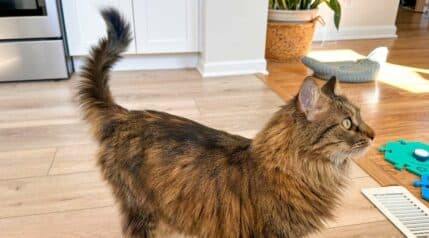When you purchase through links on our site, we may earn a commission. Here’s how it works.
It is a calm afternoon, and your sweet kitty is asleep on the sofa, a bundle of fluffy comfort and tranquility. As you watch your sweet kitty sleep, marveling at their level of peace and comfort, they suddenly start twitching. Owners often wonder what makes a seemingly peaceful cat start to twitch and shake as they sleep. Is this simply a normal reaction to an active dream about hunting, or is something else going on?
There are a few different reasons why felines might twitch in their sleep. Though some are quite harmless, watching this happen can be alarming and even scary for us.
Cats twitching while they sleep is a common behavior and not something that should necessarily cause owners alarm. Still, it is something that pet parents want to understand and often ask questions about. To help clear up some of the questions, we took a look at several of the reasons why cats twitch when they sleep.
My Cat Is Twitching When Sleeping
Felines are known for sleeping a lot. They can snooze 12 to 18 hours a day on average. This is a lot more than the five to 8 hours many humans are functioning on. Because they sleep so much, we spend a lot of time observing them, which is how many owners discover their cat is twitching.
Cats may twitch when they snooze. This is normal. Not every cat will, but this is typical behavior for many felines. Sometimes, this can make owners worry, and there are a few different reasons this can happen.
6 Top Reasons Why Cats Twitch In Their Sleep

1. Dreaming
Dreaming is one of the most common reasons felines will twitch and move when they sleep. They are mentally in another place, stalking prey, roaming new turf, wherever their dreams may take them. The twitches are simply the physical reaction they are having to this mental stimulation. Kitties drift in and out of REM sleep. Their sleeping cycle is much shorter than ours and can last just a half hour. Cats can dream even in shorter naps, so this twitching can happen at any time they are asleep.
Kitties who are sleeping have movement in their paws and twitches of the ears, nose, whiskers, and mouth. Some cats will make mouthing motions as if they are meowing, but no sound will come out. Others might meow, chirp, or moan softly. Twitching while asleep is normal. Kittens may have more vivid and rapid movements, while with older cats, it can be more subtle.
2. Muscle Spasms
Cats can have muscle spasms for a variety of reasons. Sometimes these can happen when they are asleep. These can be isolated or happen occasionally. There are some conditions that can cause spasms. These include nervous system disorders, infections like distemper, hypoglycemia, inflammation, kidney malfunction, medication side effects, or unknown causes. If you are concerned about muscle tremors, schedule an exam with your vet to go over your concerns. You can try to get a short video of your pet as they sleep, which will help your vet understand what is going on.
3. Allergies
Felines, just like humans, can suffer from allergies. These can be seasonal, environmental, or food-induced. Sometimes, twitches will be concentrated on an area that is irritated, like a paw or hind quarter. Kitties who are itchy while they snooze can even start to lick, scratch, and groom themselves as they wake up and may have an allergy. This might cause itchy skin, hives, rashes, or other skin irritations.
Cats can suffer from ear mites, which sometimes cause twitching of the ears. This can also happen with a severe wax buildup.
4. Feline Hyperesthesia
Feline Hyperesthesia syndrome (FHS) is a condition where felines have a very sensitive section of skin. This is most often located on their backsides, in the region directly in front of the tail. The condition will cause twitching. It can happen in any breed but most often is seen in Abyssinian, Burmese, and Persian, and very often in Siamese. This is often seen in younger kitties. Hyperesthesia does not just occur during sleep. Kitties will try to bite and scratch to get the itching to stop. The condition can be caused by trauma, injury, disease, or neurological issues.
This will need treatment from a veterinarian. There are some medications that can make this condition more manageable. Hyperesthesia is also called “Twitchy Cat Disease” and Rolling Skin Syndrome.”
5. Seizures
Seizures can occur in felines for a few reasons. One is idiopathic epilepsy. These uncontrollable, sudden, and sometimes very strong incidents can occur at any time and have no known cause. Cats with epilepsy will most often have seizures that start when kitties are tired or asleep. Seizures can last a few seconds to a minute or more. Your kitty will need some time to recover after a seizure and likely will seem dazed, confused, and very tired.
Twitching is much gentler than seizures, and owners should be able to tell the difference fairly easily. Twitching is usually very mild and is often localized to one part of the body. For example, a cat’s paw, leg, tail, ears, nose, or even eyes may twitch.
6. Stress
Things like stress can cause a cat to twitch when they sleep. Stress is a trigger for them, and a twitch can often happen after a rough day or uncertain time. Some cats may be stressed staying home alone or if a new pet comes into the home.
Twitches can be strong or mild and may happen while cats are snoozing or awake. They can sometimes be a direct reaction to a person or situation that they feel unsure about. Kitties may twitch when someone tries to pet or move them. Twitching can be normal or motivated by stress, fear, affection, or another need.
Why Is My Cat Shaking When Sleeping?

Twitching is most often very mild and usually on just one area of a cat. Shaking is more pronounced and involves the whole body.
Some kitties might shake when asleep because they feel afraid or anxious. Shaking helps regulate their body temperatures. Low blood sugar (hypoglycemia) is another reason for shaking. Offer kitties a snack when they wake up, as it will help with blood sugar levels.
If your purr baby is having tremors or shaking a lot, it’s advisable to have them examined and observed by the vet. You can also make sure kitties are comfortable and have a safe, cozy spot to drift off. Observe your pet and contact the vet to discuss your concerns.
Should I Wake My Cat Up When They Are Twitching While Asleep?
Do not do this. It’s unnecessary to wake your cat up if they sleep twitch. As this is most often a part of dreaming, you will be interrupting their good slumber. You do not want to frighten or shock them by waking them up suddenly. If you are very concerned and want to try waking them, do so very calmly and gently. Do not try to move them or do anything sudden.
If your cat seems to be seizing, there is no way you can wake them up, and trying to will only put you and them in more danger. Most likely, kitties are conscious in some way, and attempts at waking them up will not change or help things.
Frequently Asked Questions
We know there are plenty of questions about cats twitching when they sleep. Below, we answer some of the most often asked. If we missed yours, please share it with us in the comments.
What does a cat’s ears twitching when sleeping mean?
Sometimes, a cat’s ears twitching while asleep may be a natural response to dreaming or REM sleep. There is a possibility kitties may have ear mites, ear infections, or even a wax buildup in their ears. They may require ear cleaning or even medication from the vet. Ear infections can be quite painful, but felines are very good at hiding symptoms.
Are feline dreams the same as ours?
It is hard to tell what felines dream about, but they do experience rapid random eye movement that indicates dreaming. Our kitties are likely reliving parts from their day or favorite pastimes. Felines may not dream in exactly the same way as we do, but they certainly do dream.
Is my cat shaking in sleep something I should be worried about?
Your kitty having mild movement like occasional twitching during sleep is not something owners need to consider an emergency. If concerned, a call to the vet is a good idea. Twitching or shaking during sleep is only an emergency if a cat is having a violent reaction to something, has a seizure, or seems to be injured or experiencing trauma of some kind.
Understanding Other Feline Behaviors
Cats have a lot of quirky behaviors, and we owners are always working to understand them. Learn more about cat’s vocal communication in our article about hissing. We also cover why cats like to lick and bite us, why they like feet, and why they like to rub against us. Or, if your cat is an escape artist, learn more about why cats run away from home and how to stop it.





